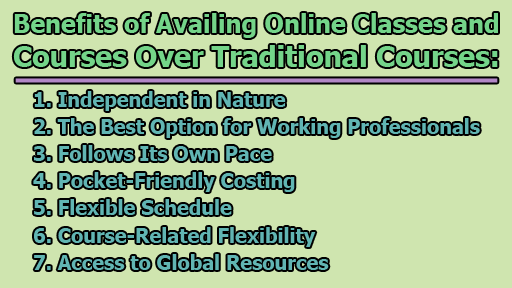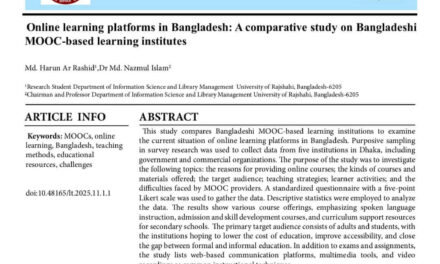Benefits of Availing Online Classes and Courses Over Traditional Courses:
In the digital age, the landscape of education is rapidly evolving, with online classes and courses emerging as a transformative force. This shift from traditional classroom settings to virtual learning environments has brought about numerous benefits, making it an increasingly popular choice for learners across the globe. In this article, we will delve into the benefits of availing online classes and courses over traditional courses.
1. Independent in Nature:
Online classes embody a sense of independence that is unparalleled in traditional education. Learners are not confined to the structured environment of a classroom; instead, they have the autonomy to choose when and where they engage with course materials. This self-directed approach is particularly advantageous for individuals who thrive in an environment where they can dictate the pace of their learning. The absence of fixed schedules allows learners to tailor their study routines to their own preferences, accommodating different learning styles and optimizing their comprehension of the subject matter.
In a traditional classroom, students often find themselves bound by the pace set by the instructor and the predetermined class schedule. This can lead to frustration for those who either need more time to grasp complex concepts or find themselves waiting for others to catch up. Online classes liberate learners from this constraint, allowing them to delve deeper into challenging topics or breeze through familiar content at a pace that suits their individual needs. As a result, the learning experience becomes more personalized, fostering a deeper understanding of the material and promoting a sense of ownership over one’s education.
Moreover, the independent nature of online classes empowers students to take charge of their learning journey. The ability to manage their time and study environment cultivates essential skills such as self-discipline and time management – attributes that are invaluable not only in academic pursuits but also in the professional realm. As learners navigate through the course content at their own pace, they develop a heightened sense of responsibility, setting the stage for a more self-assured and self-reliant approach to education.
2. The Best Option for Working Professionals:
Online classes emerge as the preferred choice for working professionals seeking to augment their skills or pursue advanced degrees while managing the demands of a career. The flexibility inherent in online education aligns seamlessly with the dynamic schedules and commitments of professionals, enabling them to strike a balance between work, personal life, and education.
Traditional classes often necessitate a fixed schedule that may clash with the working hours of professionals, making it challenging for them to attend regular classes. Online courses, on the other hand, operate asynchronously, allowing individuals to access lectures, assignments, and discussions at a time that suits them best. This flexibility liberates working professionals from the constraints of rigid timetables, empowering them to engage with course materials during evenings, weekends, or any spare moments in their busy lives.
Additionally, the elimination of the need to commute to a physical campus saves valuable time for working professionals. Online education brings the classroom to their fingertips, eradicating geographical barriers and providing access to world-class instructors and institutions without the need to relocate. This accessibility ensures that professionals can pursue higher education or acquire new skills without compromising their career trajectories or sacrificing family and personal commitments.
The self-paced nature of online classes is particularly advantageous for working professionals who may face unpredictable work schedules, frequent business trips, or irregular working hours. It allows them to progress through the coursework at a rhythm that accommodates their professional responsibilities, minimizing stress and enhancing overall learning outcomes. As a result, online education stands as the ideal solution for individuals aiming to advance their careers without interrupting their professional journeys.
3. Follows Its Own Pace:
Online classes break away from the conventional structure of fixed schedules and rigid timelines, offering learners the freedom to progress through the coursework at their own pace. This adaptability is a cornerstone of the online learning experience, catering to a diverse range of learning styles and ensuring a more effective and enjoyable educational journey.
In traditional classrooms, the pace of learning is typically dictated by the instructor, with a set curriculum and predetermined timelines for each topic. This one-size-fits-all approach can be limiting for students who may require additional time to grasp certain concepts or, conversely, find themselves disengaged due to a slower pace. Online classes, by contrast, liberate learners from the constraints of a uniform schedule, allowing them to spend more time on challenging topics and move swiftly through familiar ones.
The self-paced nature of online education also accommodates the varied commitments of learners, whether they are working professionals, parents, or individuals with other time constraints. Learners can schedule their study sessions at times that align with their peak productivity, enhancing the quality of their engagement with the material. This flexibility not only contributes to a more personalized learning experience but also fosters a sense of responsibility and ownership over one’s education.
Moreover, the ability to revisit and review course materials at any time promotes a deeper understanding of the subject matter. Students can go back to previous modules, review lectures, and take additional time to complete assignments, ensuring a comprehensive grasp of the material. This adaptability is especially beneficial for individuals with different learning paces and preferences, making online classes an inclusive and effective mode of education for a diverse range of learners.
4. Pocket-Friendly Costing:
Online classes often present a more cost-effective alternative compared to traditional education, making higher education and skill development accessible to a broader demographic. The financial advantages of online education manifest in various aspects, ranging from reduced tuition fees to the elimination of additional expenses associated with attending a physical campus.
Traditional education often involves considerable expenses beyond tuition fees, including commuting costs, accommodation, and various campus-related fees. Online classes eradicate the need for such expenditures, allowing learners to save on travel expenses and accommodation fees. As a result, individuals can pursue their educational goals without incurring the additional financial burden associated with attending on-campus classes.
Moreover, many online courses are priced more competitively than their traditional counterparts. Online institutions, free from the infrastructure costs of maintaining physical campuses, can pass on these savings to students in the form of lower tuition fees. Additionally, online learners can avoid expenses related to textbooks by accessing digital materials, further reducing the overall cost of education.
The cost savings extend beyond direct educational expenses, encompassing the indirect costs associated with attending traditional classes, such as the need for specialized attire, meals, and other miscellaneous expenditures. This affordability makes online classes an attractive option for individuals seeking quality education without the financial strain typically associated with pursuing a degree or acquiring new skills through traditional means.
Therefore, the pocket-friendly costing of online education democratizes access to learning opportunities, ensuring that individuals from diverse socioeconomic backgrounds can pursue their educational aspirations without being hindered by financial constraints. This affordability factor contributes significantly to the rising popularity of online classes in today’s educational landscape.
5. Flexible Schedule:
Flexibility in scheduling is a hallmark of online classes, offering learners the freedom to create a study routine that aligns with their individual preferences and commitments. Unlike traditional classes that adhere to fixed timetables, online education allows individuals to balance their studies with work, family responsibilities, and personal pursuits, resulting in a more adaptable and less stressful learning experience.
With the absence of fixed class schedules, learners can access course materials at any time, facilitating a learning environment that caters to various chronotypes and peak productivity hours. This adaptability is particularly advantageous for individuals with irregular work schedules, allowing them to engage with course content during periods of optimal concentration and focus.
The flexibility in scheduling also accommodates individuals with familial responsibilities, enabling parents to structure their study sessions around childcare duties and family commitments. As a result, online education becomes a viable option for individuals who might find it challenging to attend traditional classes due to the constraints of family life.
Furthermore, the flexibility of scheduling contributes to a healthier work-life-study balance. Learners can avoid the stress and time pressure associated with commuting to physical classrooms, as online classes bring the education directly to their homes or preferred study environments. This eliminates the need for long commutes and allows individuals to allocate more time to their personal and professional lives, fostering overall well-being.
Consequently, the flexible schedule offered by online classes empowers learners to take control of their time, fostering a learning environment that is conducive to their unique needs and preferences. This adaptability is a key factor in the growing popularity of online education, especially among those seeking a harmonious integration of education into their multifaceted lives.
6. Course-Related Flexibility:
Online education provides an extensive range of courses and programs, offering learners the opportunity to tailor their educational journey to align with their interests, career goals, and skill development needs. The diverse array of online courses ensures that individuals can choose programs that are directly relevant to their professional aspirations, providing a level of customization often unavailable in traditional education.
In traditional institutions, course offerings may be limited by factors such as faculty availability, physical classroom space, and logistical constraints. Online classes, however, transcend these limitations, enabling learners to access a broad spectrum of subjects and specialties. This diversity is particularly beneficial for those seeking niche or specialized knowledge not readily available in traditional academic settings.
The availability of online courses also allows learners to explore interdisciplinary studies and acquire a diverse skill set. For example, a business professional may complement their expertise with courses in data analytics or digital marketing. This interdisciplinary approach is crucial in today’s dynamic job market, where employers often seek individuals with a broad range of skills that extend beyond a traditional academic focus.
Moreover, the agility of online education platforms enables the incorporation of the latest industry trends and advancements into course curricula. This ensures that learners receive up-to-date and relevant information, preparing them for the rapidly evolving demands of the professional landscape. The course-related flexibility of online education, therefore, positions learners to stay ahead in their careers by acquiring cutting-edge knowledge and skills.
Subsequently, the variety and adaptability of online courses empower learners to design a learning path that aligns precisely with their career objectives and personal interests. This course-related flexibility is a compelling reason for individuals to choose online education as it caters to the diverse and evolving needs of learners in today’s rapidly changing world.
7. Access to Global Resources:
Online education transcends geographical boundaries, providing learners with unprecedented access to a wealth of global resources. Through digital platforms, students can engage with instructors, experts, and peers from around the world, enriching their educational experience with diverse perspectives and insights.
Traditional education often limits students to the resources available within the confines of a physical campus. In contrast, online classes open up a vast array of digital resources, including recorded lectures, e-books, articles, and multimedia content. This abundance of materials ensures that learners have access to the latest research, industry trends, and diverse perspectives, enhancing the depth and breadth of their education.
The global reach of online education is particularly beneficial in connecting learners with instructors and professionals who are leaders in their respective fields. Through virtual interactions, students can participate in discussions, attend webinars, and collaborate on projects with individuals from different cultural backgrounds. This exposure to a global network not only broadens their understanding of various subjects but also cultivates valuable cross-cultural communication and collaboration skills.
Furthermore, the digital nature of online education enables institutions to tap into a pool of international talent when selecting instructors and designing course content. Learners, in turn, benefit from the expertise of instructors who bring a global perspective to the table, ensuring that the education they receive is relevant and attuned to a worldwide context.
Hence, the access to global resources in online education transcends traditional constraints, offering learners a borderless learning experience. The opportunity to connect with a global community of educators and learners fosters a more enriched and interconnected educational journey, preparing individuals for success in an increasingly interconnected and globalized world.
In conclusion, the benefits of online classes and courses are multifaceted, catering to the evolving needs of modern learners. From the flexibility of scheduling to the cost-effectiveness, online education is redefining the way we acquire knowledge. Embracing this digital shift allows individuals to pursue education on their terms, making learning more accessible, personalized, and relevant to the demands of the contemporary world. As the digital era unfolds, online education stands as a beacon of innovation, empowering learners to chart their educational journey with unprecedented flexibility and convenience.

Library Lecturer at Nurul Amin Degree College










